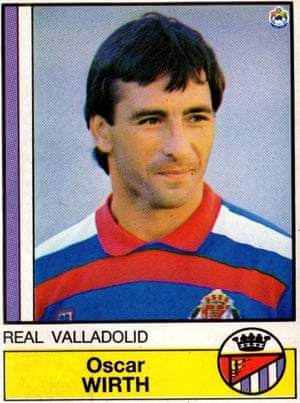[ad_1]
One of the sweetest moments in football comes when an outfielder has to don the gloves and finish a match in goal. It does not happen often but it is always thrilling. But what about when the opposite occurs? What about when a goalkeeper is forced to play outfield? That is much rarer. There have been a few examples over the years. Fabien Barthez and Shamal George spent some time outfield during friendlies. David James and Ray Wood even went up front during competitive fixtures – Wood doing do in the FA Cup final. However, Oscar Wirth went further than that. He completed 90 minutes at centre-back for Real Valladolid in La Liga in 1987.
Wirth had already enjoyed an interesting career when he joined Valladolid in the summer of 1986. Not only had he played for all of the “big three” clubs in Chile – Universidad Católica, Colo-Colo and Universidad de Chile – but he had also represented his country at the 1982 World Cup in Spain and had a stint with German club RW Oberhausen.
Due to problems with his international clearance, Wirth was not able to make his debut in the opening rounds of the season. By the time he was eligible, long-time starter Carlos Fenoy had cemented his place for another campaign. So Wirth had to wait for his chance.
When Wirth finally made his debut in La Liga, at Sevilla on 12 April 1987, he did not play instead of Fenoy but alongside him. Valladolid had a problem. Starting centre-backs Manolo Hierro and Enrique Moreno were both unavailable, as was starting left-back Juan Carlos. They had one natural centre-back in Martín Sáez but he had only played 180 minutes all season.
The bigger concern was how to fill the other central defensive spot in coach Xabier Azkargorta’s back four. With so few options, Azkargorta – who already knew that he wouldn’t be staying on for the following season – decided to opt for his second-choice goalkeeper.

Valladolid had three goalkeepers in their squad that season – Fenoy, Wirth and José Luis Rodríguez, who ended up on the bench in Seville – so Wirth often played centre-back during practice games in training. He had played at right-back and at centre-back until he was 15, so it wasn’t a completely alien concept to him. Never, though, had he faced the prospect of playing as an outfielder in Spain’s top division.
This wasn’t an easy fixture, either. Sevilla were three places above Valladolid in the table and were at home in their fortress, the Estadio Ramón Sánchez Pizjuán. It would have been a tough match under any circumstances, but even more so with a depleted defence anchored by their No 13.
Somehow, with their two goalkeepers on the pitch, Valladolid won 2-1. It was their first away victory in seven months. Manolo Peña scored at the start of each half and Sevilla could beat the makeshift visiting defence only once. This was quite a victory and the reserve shot-stopper was at the heart of it.
“Wirth shone as a centre-back,” reported Juan Méndez in El País. “He organised the defensive line with leadership and with talent. He was always in position, though it’s true that he often acted more as a sweeper than as a man-marker. He dominated in aerial play and didn’t allow Sevilla strikers Ramón or Cholo, who have been good in front of goal recently, to get the better of him.”
Wirth played down his performance. “Every professional player should be able to play in various positions,” he told the press after the game. “I was aware of the difficult nature of the situation and aware of how difficult this was for the coach, who took a risk. I had prepared well, though, and I think I responded well to the call.”
There was no doubt about that. Wirth also worked as a part-time PE teacher in Valladolid and said fans would regularly ask him to start playing outfield. He was never again picked in defence, but he did play as a ’keeper four times that season, finally getting a chance to show he could perform in the position he had been hired to fill.
Wirth made six more appearances for the club the following season before bowing out of Spanish football in May 1988 with a 2-1 defeat at the Bernabéu in the final game of the season. He moved back to South America that summer, signing for Independiente Medellín in Colombia, and later returned to Chile to play for Universidad Católica, with whom he reached the Copa Libertadores final in 1993.
One day in Seville, though, made Oscar Wirth the man of the hour and will take up lots of space in the index of his biography.
• This article is from These Football Times
• Find These Football Times and Euan McTear on Twitter
[ad_2]
Source link

